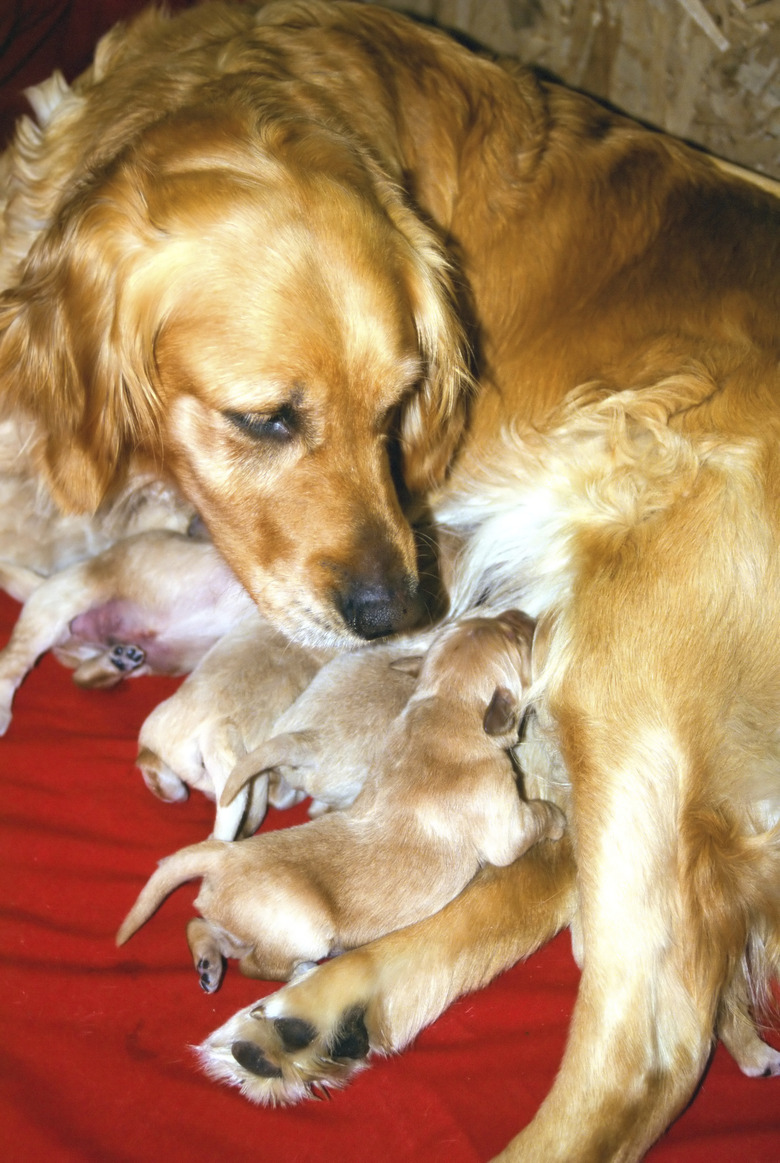Dehydration In Newborn Puppies
Dehydration is not terribly unusual in newborn puppies. If puppies are orphaned, they may not receive sufficient fluids because they are not nursing enough, regardless of whether they are being fed regularly or not. Even puppies nursing off their mother can be dehydrated for physical or environmental reasons. While dehydration is not unusual, it can be life-threatening. Seek veterinary treatment if a puppy is unable to suckle or is not responding to treatment.
Causes of Dehydration
Causes of Dehydration
Puppies with cleft palates may have difficulty latching on to a nipple, preventing them from nursing efficiently. Newborn puppies who fail to ingest enough breast milk will become dehydrated over time.
In addition, certain breeds are prone to having renal dysplasia, a genetic defect that results in improperly formed kidneys. All dogs are born with immature kidney that develop as they grow. However, Alaskan malamutes, cocker spaniels, Doberman pinschers, soft coated wheaten terriers and standard poodles, as well as some other breeds, are prone to a condition called renal dysplasia. Puppies with this condition are undersized when they are born and may not develop full-sized kidneys as they mature. This condition causes the dog to urinate excessively, preventing the absorption of some nutrients as well as dehydration.
Symptoms of Dehydration
Symptoms of Dehydration
Dehydration is characterized by sunken eyes and dark yellow urine. With newborn puppies, sunken eyes can be difficult to determine, as they will not open their eyes until they are about 10 days of age. In addition, it may be difficult to determine how yellow the puppy's urine is, as it is stimulation by the dam that causes a puppy to urinate for his first 30 days of life.
It is possible to detect dehydration in newborn puppies by monitoring saliva production and skin tenting. A dehydrated puppy will produce insufficient saliva or no saliva at all. When the puppy's skin is gently pinched between two fingers, it will return to its normal position very slowly or remain tented, depending on how much hydration remains in the skin. If your newborn puppy is crying and nothing appears to be physically wrong with him, check him for dehydration.
When to Seek Veterinary Treatment
When to Seek Veterinary Treatment
It may be possible to rehydrate a slightly dehydrated puppy without professional help. Puppies should seek out their dam's nipples and latch on without encouragement. They will often claim a particular nipple as their own. If a puppy appears to be distressed, a good first step is to check the female's nipples to be certain she is providing enough milk. Provide her with more food if it seems that she is not producing enough milk for her puppies and ensure that she always has access to plenty of water.
Severe or continued dehydration can be life-threatening. Bring the female dog and her puppies to the veterinarian if any of her nipples feel hard or hot to the touch, if milk production does not increase with increased food or if the puppies seem dehydrated.
Rehydrating the Puppy
Rehydrating the Puppy
Puppies can be rehydrated in two ways: milk replacement and fluid therapy. Bottle feeding is the preferred method for milk replacement; however, the hole in the nipple must be large enough to allow the puppy to nurse with ease without being so large that the puppy can inhale rapidly moving formula. Milk or formula also can be administered using an eye dropper. Weak puppies may need to be fed using a feeding tube. Feeding tubes should only be used with veterinary supervision.
Fluid therapy involves injecting fluid directly into a puppy's vein, under his skin or into his abdomen. Lactated ringer's solution, 0.09 percent saline solution or similar solutions are most commonly used. Your veterinarian can teach you to administer subcutaneous (under the skin) fluids, if necessary. Do not attempt to administer fluid therapy without veterinary assistance.
Always check with your veterinarian before changing your pet's diet, medication, or physical activity routines. This information is not a substitute for a vet's opinion.
